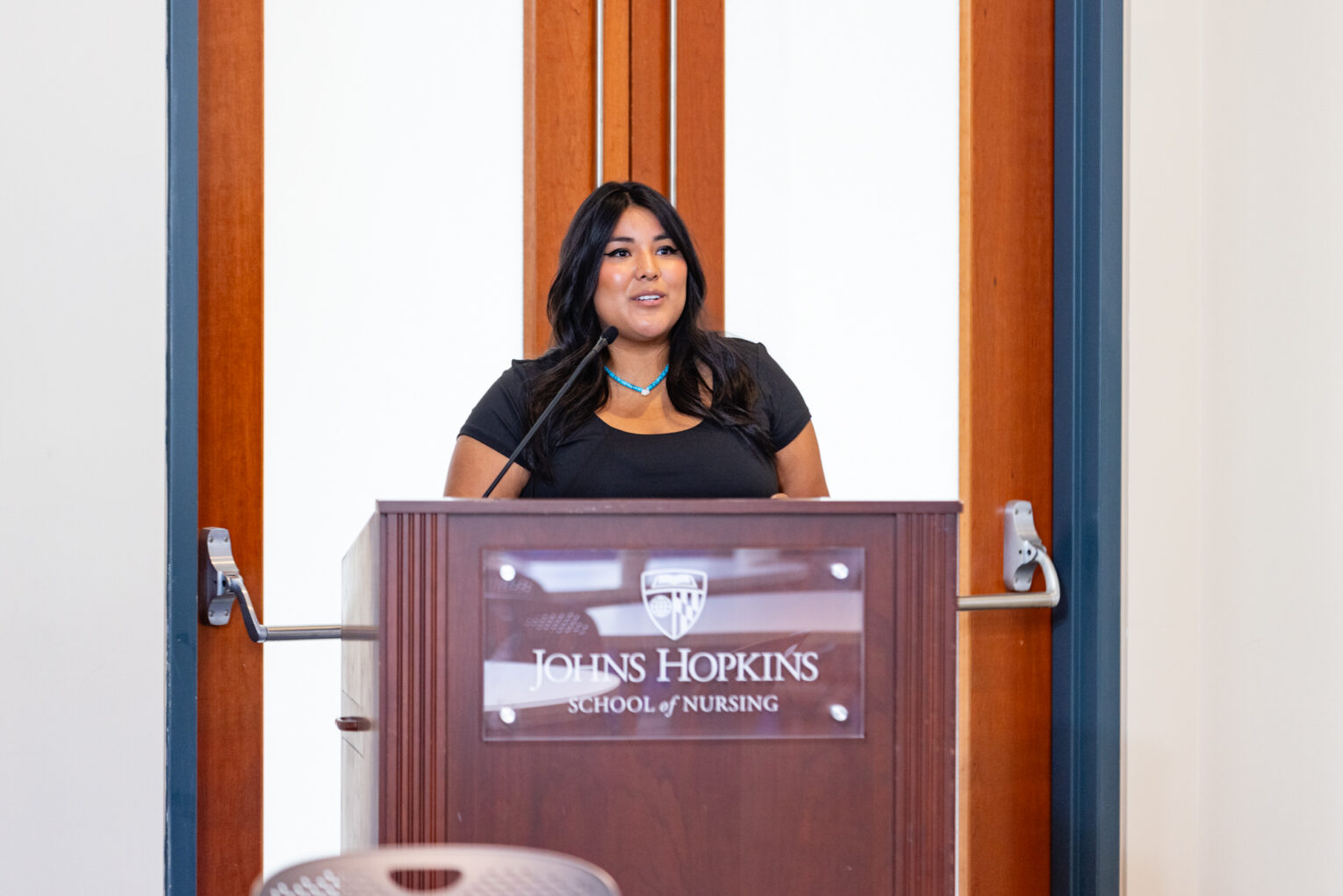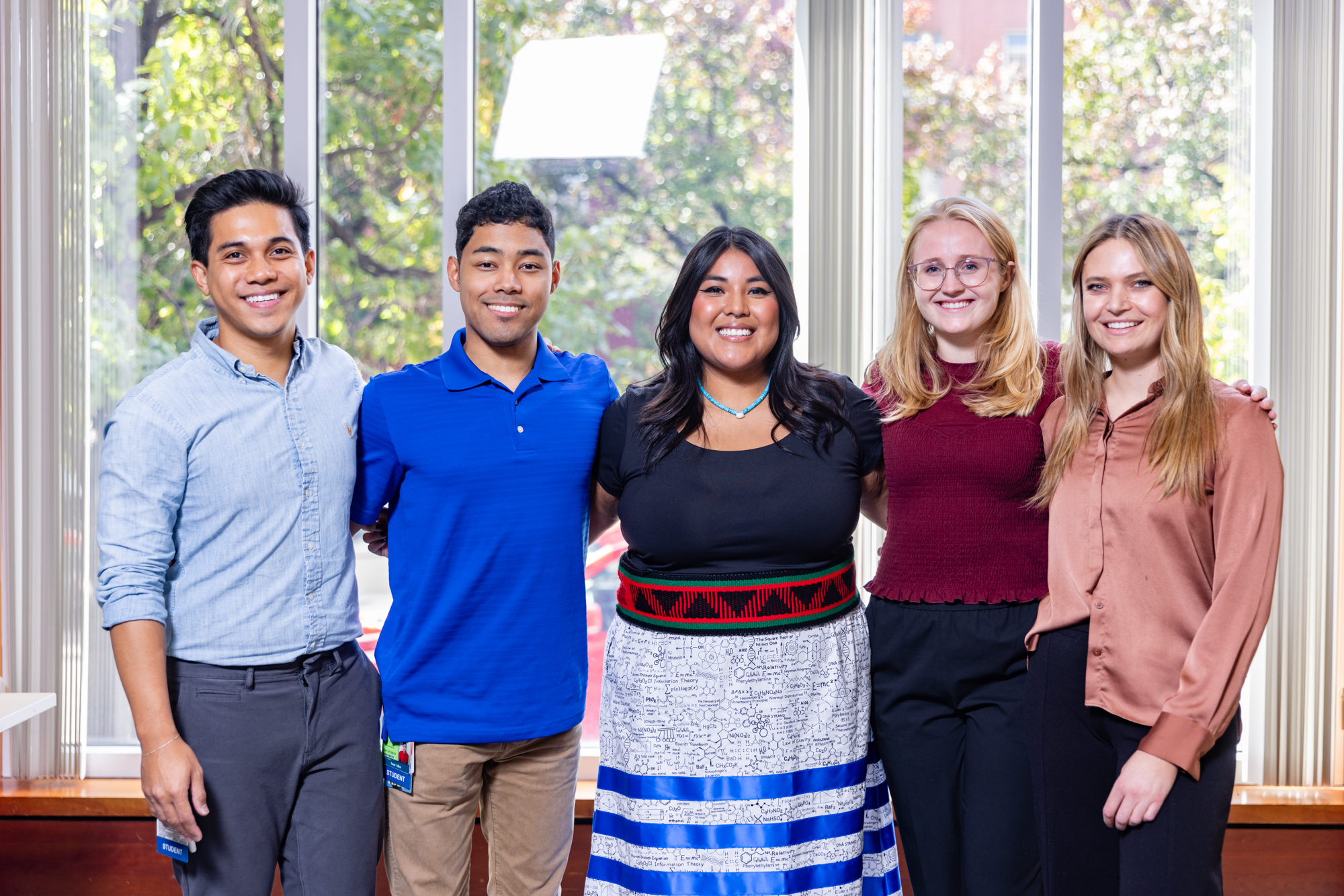On October 14th, The Johns Hopkins School of Nursing recognized Indigenous Peoples Day to shed light on the resilience of Indigenous people and their ancestors who recognize the strength they have carried since the arrival of European ships. This year, the Indigenous Student Nurses and Allies Association (ISNAA), proudly celebrated Indigenous People’s Day within the Johns Hopkins School of Nursing. In collaboration with Associate Professor, Teresa Brockie, PhD, RN, FAAN (A’aninin Nation from Fort Belknap, Montana) and her team, ISNAA hosted a meaningful event centered on food sovereignty and traditional knowledge.
The highlight of the day was guest speaker Chasity Salvador, a young farmer, traditional seed keeper, birth worker, and scholar. Chasity shared her personal experiences, moving poetry, and powerful messages about the importance of protecting Indigenous food systems and native plant relatives. Attendees also participated in some hands-on activities, including creating custom tea blends and enjoying a homemade winter squash soup, which helped ground the event in nourishment, tradition, and environmental awareness.
Chasity’s work revolves around growing food and saving seeds for her family within the Acoma Pueblo community. As a traditional seed keeper, she stressed how important it is to protect native plants, which carry ancestral knowledge and provide healing benefits. She shared a story from her first foraging experience when she was drawn to a plant with berries that turned out to be Wolfberries (Goji berries), rich in vitamin C and fiber. She said, “In that moment, I remembered the teachings from my elders about how the plants we need most will reveal themselves to us,” reminding us of our deep connection to the land and the healing it offers.
Chasity’s message went beyond personal stories—it was a powerful call to action. She emphasized the urgent need to protect Indigenous plants as they face growing threats from climate change.
“Our plants are the first ones feeling the effects of climate change. If we don’t protect them now, we’re losing more than just a food source. We’re losing the wisdom of our ancestors and the key to our future resilience.”
Chasity highlighted the importance of traditional ecological knowledge and food sovereignty in not only sustaining communities but also combating environmental destruction driven by extractive practices.
In addition to Chasity’s talk, attendees had the chance to get creative with tea-making. attendees were offered iced Navajo/Indian tea with a strawberry purée, which was refreshing and flavorful, alongside a “make your own” hot tea station with herbs commonly used in Indigenous culture, including nettle, rose hips, and mullein. It was a great way for everyone to connect with traditional plant medicines while also practicing environmental consciousness by bringing their own mugs to minimize waste. Plus, the winter squash soup was a perfect seasonal touch, showcasing seasonal, sustainable food.
Chasity’s poetry left a lasting impression. Her words captured the struggles and resilience of Pueblo women in the face of colonialism, capitalism, and environmental destruction. Many audience members expressed how her words gave voice to emotions they hadn’t yet articulated.
Overall, the ISNAA event offered a powerful and meaningful celebration on Indigenous Peoples Day. It brought attention to the importance of honoring Indigenous knowledge, protecting native plants, and practicing environmental awareness—all essential steps toward a healthier and more sustainable future for generations to come.

Be sure to follow ISNAA (@hopkins.isnaa) and the Center for Indigenous Health (@johnshopkinscih) for more upcoming events in honor of Native American Heritage Month.
Read More:
- Louise Three Stars Smith Turns 100, and Offers a Legacy of Healing for Native Nurses
- Creating Inclusive Academic Spaces: The Role of Indigenous Allies
- What Works: Community-Led Research Promotes Evidence-Based Strategies to Improve Indigenous Health by Championing Indigenous Nursing Practice
The Indigenous Student Nurses and Allies Association (ISNAA) is a student-led organization at JHSON composed of 4th semester MSN students. Our inclusive community includes both tribal and non-tribal (ally) members, united by the mission to uplift and support Indigenous peoples locally, domestically, and globally. We are dedicated to fostering community bonds, collaborating with tribal nations and urban Indigenous populations, and advocating for Indigenous empowerment through education, cultural humility, and meaningful engagement.
The Authors:
Phoebe Keryte: Chair; Diné Isleta and Santa Ana Pueblo
Autumn Jensen: Co-Chair; Citizen Potawatomi Nation
Sean Allen: Council Member 1: Ally
Jake Abalorio: Council Member 2: Ally
Didi Petkiewicz: Council Member 3: Ally
